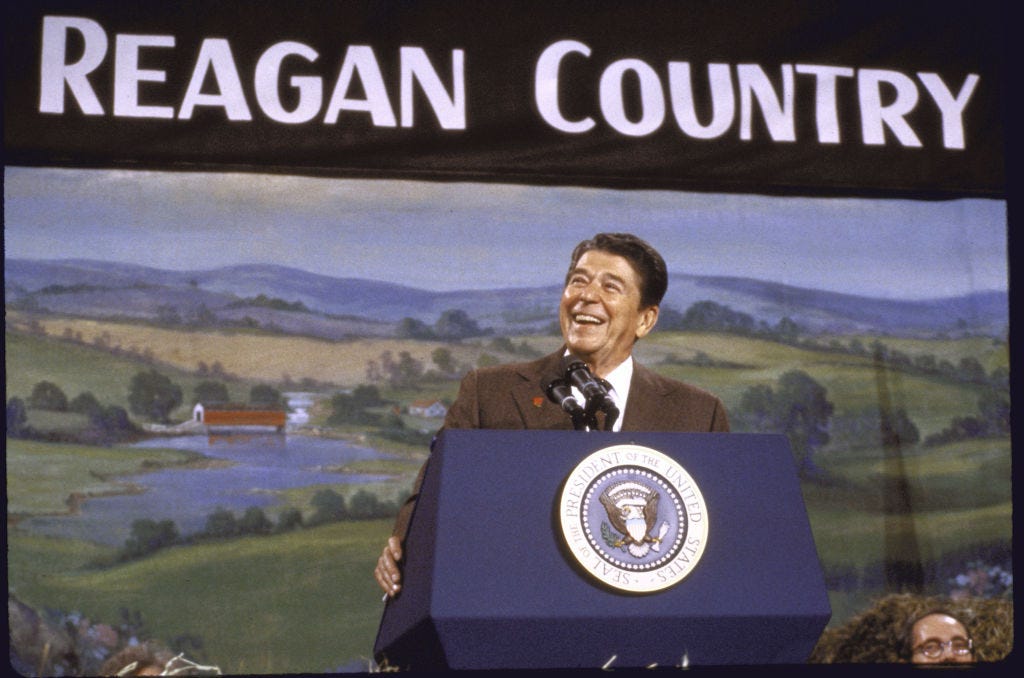What happened to the Republican Party?
Author Max Boot on Ronald Reagan’s legacy, the roots of Trumpism, and how the Great Communicator opened the door to the far right
As the Republican Party gathers this week in Milwaukee to nominate a far-right ticket in the wake of an assassination attempt and against the background of a judicial upending of the very notion of the presidency, you may be wondering how we got here.
How, exactly, did “Morning in America” lead to the American carnage of Trumpism?
Journalist and historian Max Boot’s forthcoming critical biography of Ronald Reagan, Reagan: His Life and Legend, begins to get at the answers to those questions by reassessing the conservative icon from the perspective of this very different era.
Based on interviews with more than 100 former colleagues, staffers, associates, and relatives as well as archives newly made public, Boot — who wrote the book during his journey away from the Republican Party — reveals Reagan as far more of a right-wing ideologue than we’ve previously understood and as a more pragmatic politician too, who operated in a less polarized political environment by striking deals with opponents, building bipartisan consensus, and constructing a broad public appeal based in personal charm and an optimistic narrative that let his devotees find meaning for themselves, even as he moved his party and the country to the right and away from faith in government’s ability to work for the public good.
As an early devotee of alternative facts, a defier of Congress, and an anti-government crusader even as he ran the government, Reagan followed Goldwater and Nixon in further opening the door for far-right forces to enter the mainstream and played an essential role in the long rightward turn of the Republican Party that led to Donald Trump.
We talked to Boot about Reagan’s transit from New Dealer to right-winger, what we can learn from his tenure about how and why the Republican Party has moved so far to the right overall, what might be worth rescuing in Reagan’s legacy, and about the lasting economic and social impacts of Reagan’s policies, which set in motion the mounting inequality that’s been so corrosive for American democracy ever since.
If you’re looking for more insight into the roots of Trumpism and the far right, this is a conversation you won’t want to miss.
A request for those who haven’t yet joined us: The interviews and essays that we share here take research and editing and much more. We work hard, and we are eager to bring on more writers, more voices. But we need your help to keep this going. Join us today as a paid subscriber to support the kind of independent media you want to exist.
Talk a little about your political journey, the genesis of the book, and how and why you’ve come to reassess Ronald Reagan.
I came to the United States in 1976 from the Soviet Union when I was seven years old with my mother and grandmother. And like a lot of immigrants from communist countries, I gravitated to the right in the United States. I was a huge fan of Reagan in the '80s, and he helped to make me a Republican and led me to the right. Then thanks to Donald Trump, I left the Republican Party in 2016 because I no longer recognized what it was and have been independent ever since.
I launched the Reagan biography in 2013 while I was still a Republican, and I think the fact that I'm no longer a Republican, very much opposed to the current direction of the Republican Party, gives me a kind of independence of perspective that I would have lacked if I thought I was still playing on Reagan's team, which I definitely am not.
Now I'm really trying to examine how the Republican Party and the United States got this way and to think about, the rise of Trump and the changes we've seen in the country in the last few years; those provide a new perspective that previous authors would not have had on the Reagan presidency and the Reagan legacy.
I can see both his foibles and his strengths, his achievements, as well as his failures, and try to present both to readers, trying to figure out how America got this way.





